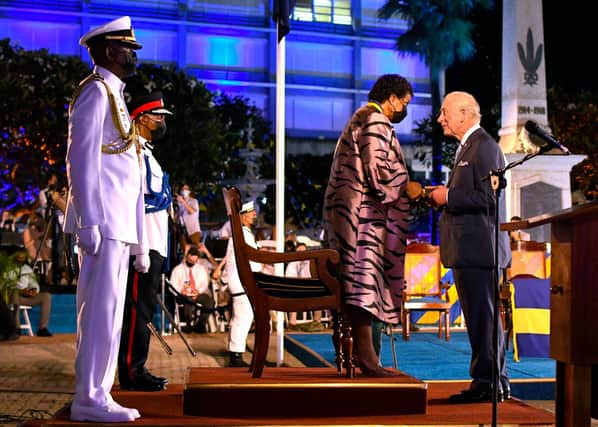Why Barbados's decision to become a republic is an inspiration to Scotland – Laura Waddell


Taking over the top ceremonial role is President Sandra Mason. She said in a rousing speech: “Today debate and discourse have become action. Today we set our compass to a new direction. For this day and forever we declare Barbados a parliamentary republic.” Joining her in leading the ceremony was Prime Minister Mia Mottley.
Prince Charles was at the midnight ceremony in Bridgetown to witness the Royal Standard flag being lowered. If that was a sombre moment for him, the event’s overall mood was of celebration and music, with pop star and cultural ambassador Rihanna being honoured as a National Hero.
Advertisement
Hide AdAdvertisement
Hide AdThe diplomatic words the king-in-waiting shared to mark the occasion spoke of “the darkest days of our past”, referring to slavery, and ended on a note of friendship.
But friendship, a state of mutual respect, will be quite different from the dynamic up until now of colonial power and subject. As we can see from our ever more isolated political situation in Europe, relationships of mutual respect are something Britain still struggles in the present day to accept, seeing parity as a blow to pride, interpreting equal footing as submission.
No matter that he may personally be on the cusp of great change as the Queen misses public events and speculation builds about royal succession, or that he paid lip service to past atrocities, Charles will only ever represent a Britain of the past.
His entire presence in Barbados was as an emblem of old Britain, a country struggling to face up to the fact it has been diminished in international status since Elizabeth took to the throne in the 1950s.
Charles was there to symbolise the very thing Barbados has decided to reject. The pass-me-down powers of our monarchy may now be a thing of the past for Barbados but here they remain a living antiquity, like so many other features of British power.
A white-knuckle grip on the past, and unwillingness to evolve, can be seen not only in royal rigmarole and pomp and ceremony but in the very fixtures and fittings of Westminster. Britain is a crumbling museum of faded grandeur, and not a very accurate one at that.
A strand of Scottish independence thinking sometimes conflates the position of Scotland with countries that were brutally colonised. This is a historical mistake, diminishing the role our own country played in atrocities and subjugation. It is also a mistake because true change requires clear-eyed clarity. To know where we’re going and why we need to know where we’ve been.
Mason’s words were infused with ambition: “Possessing a clear sense of who we are, and what we are capable of achieving, in the year 2021, we now turn our vessels about towards the new republic. We do this so that we may seize the full substance of our sovereignty.”
Advertisement
Hide AdAdvertisement
Hide AdNext to Charles, Mottley and Mason were there because they had earned their places, elected by citizens. These two women leaders are figureheads of a modern nation choosing a future of self-determination. It is inspiring to see.
A message from the Editor:
Thank you for reading this article. We're more reliant on your support than ever as the shift in consumer habits brought about by coronavirus impacts our advertisers.
If you haven't already, please consider supporting our trusted, fact-checked journalism by taking out a digital subscription.
Comments
Want to join the conversation? Please or to comment on this article.

